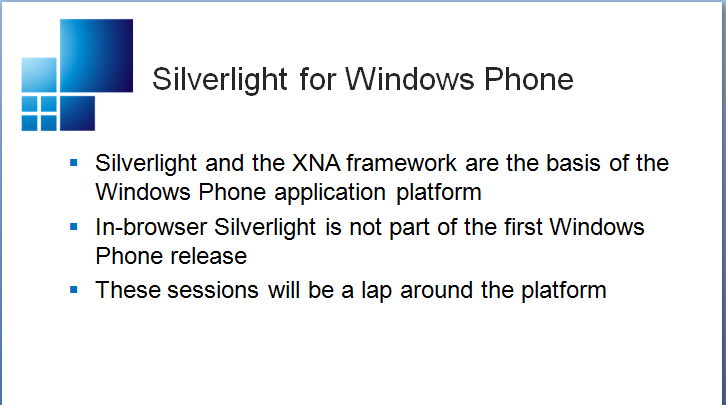First Windows Phone 7 devices won't run Silverlight in the browser

This may be obvious to some, but in case you were wondering: The first Windows Phone 7 devices aren't going to be able to run Silverlight in the browser.
Silverlight is the primary development platform for Windows Phone 7. Since Silverlight 4 isn't quite done yet, Microsoft is providing Windows Phone 7 developers with a version of Silverlight 3 enhanced with some Silverlight 4 features, for development purposes, company officials said this week.
But Silverlight also is a browser plug-in that enables viewing of multimedia content, the same way Adobe's Flash does. The few smartphones that do support browser plug-ins like Flash support FlashLite, not full Flash, because the processors in phones haven't been powerful enough to support them.
Product Manager Mike Harsh noted that Silverlight won't run in the browser on the first generation of Windows Phone 7 devices during his presentation about developing for Windows Phone 7 at Mix this week. Here's a slide from his deck:
When I asked a spokesperson for more details about Microsoft's plans to support Silverlight as a browser plug-in on phones, I received back this statement via e-mail:
"In its first release, the Windows Phone browser does not support a browser plug-in model. We are evaluating this for future releases of Windows Phone. It is very straightforward to take an existing Silverlight browser based application and re-compile it to target the Windows Phone. Silverlight 4 has not yet been released. We will be sharing more details on Windows Phone support for Silverlight 4 once both products are in the market. Stay tuned."
We still don't know exactly when Microsoft and Adobe will manage to get the Flash player on Windows Phone 7 devices (the pair have said they're working together to do so). I wonder if the Flash player debut ahead of Silverlight on phones running Microsoft's Windows Phone OS 7.0....
Microsoft Lead Product Manager Brian Goldfarb said last year that Silverlight 3 would be supported on Windows Phone 7 (back when it was known as Windows Mobile 7). It was unclear at that time whether he was talking about Silverlight the development platform or Silverlight the runtime player; I think many of us assumed it was the latter.
Meanwhile, in other related news, the emulator for Windows Phone 7 has been unlocked by developer Dan Ardelean, just days after Microsoft made it available to programmers interested in getting a head start on writing apps for Windows Phone 7.
Update: One of my readers, Martin Bennedik, questioned Microsoft's claim that the first iteration of the Windows Phone 7 browser wouldn't support a plug-in model. He said he was able to get Silverlight to work using the Windows Phone 7 emulator.
"My Silverlight chess board is displayed, although the screen of the emulator has a lot of flickering, and I didn't manage to use the UI. You can verify this yourself by going to www.bennedik.de/Silverboard.html in the emulator's browser. This wouldn't display at all if their claim about no plug-in model would be true, I think," he said.
Finally, as this big week for Windows Phone 7 comes to a close, Microsoft is battling claims that Windows Phone 7 is not going to meet enterprise users' needs.
In a March 18 blog post, Charlie Kindel, Microsoft Partner Group Program Manager for the Windows Phone Application Platform & Developer Experience refuted the idea that Microsoft forgot about business users when designing Windows Phone 7.
"Windows Phone 7 Series will be a great business phone. We applied the same end user focus to designing the phone’s business capabilities that we did with every other element of the phone. We asked people and even IT administrators what they need from a phone. The answer was consistent. They want a single device that excels at core business functions like email, reading and editing Office documents and collaboration, while also offering rich features and capabilities that help people stay on top of the different parts of their lives, at home and at work.
"We expect Windows Phone 7 Series to appeal to people who are active, connected and working, so Exchange & SharePoint integration and the features within the new Office hub are core to the phone’s value. Similarly, we know that people add these phones to corporate networks and that we need to make that process easy for administrators. Interestingly, when we talk to corporate IT staff and business decision makers they ask us to give them a compelling phone that will not only improve productivity, but also appeal to the end user’s “whole life,” as people wish to carry only one Smartphone to meet both business and personal needs. We think Windows Phone 7 Series will do this better than any other phone on the market today.
For us, it’s not a matter of 'consumer' OR 'corporate.' We view our target customer as the kind of person who is looking to technology as a helper in their lives, and we find this kind of person in small businesses, all the way to the largest corporations. Whichever end of the spectrum they are in, we are building a phone that works for them, in their environment."
I'll be interested to see if business users agree with this assessment. So far, I'm hearing from a number of business customers that Windows Phone 7 is too consumer-focused for them to use as a hybrid platform....
